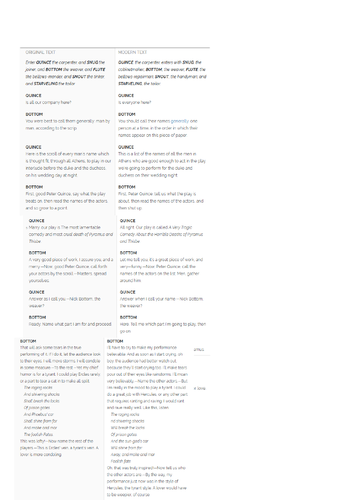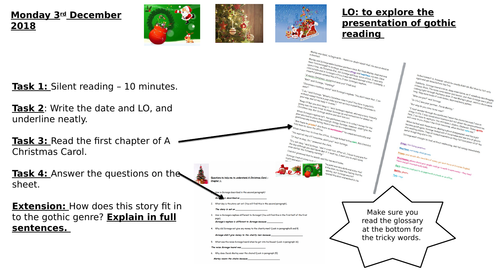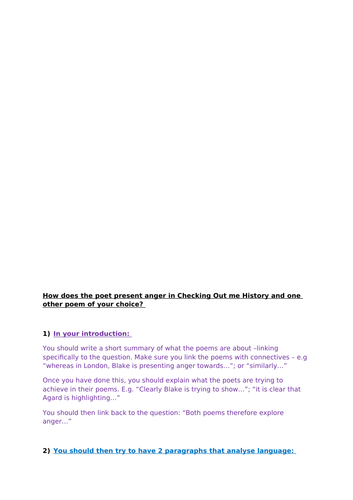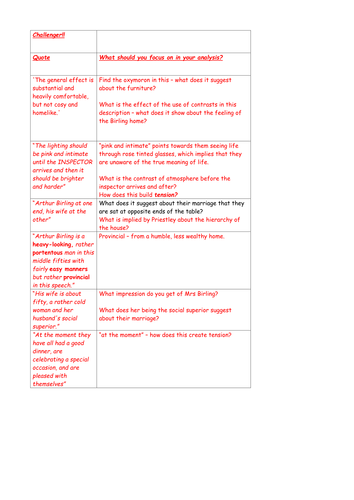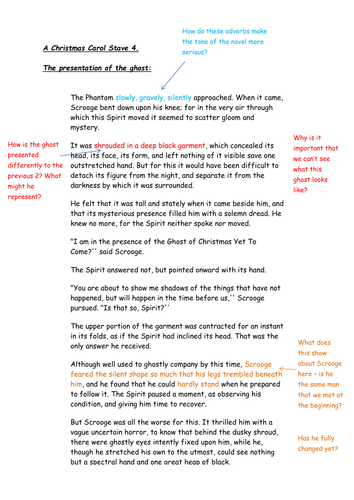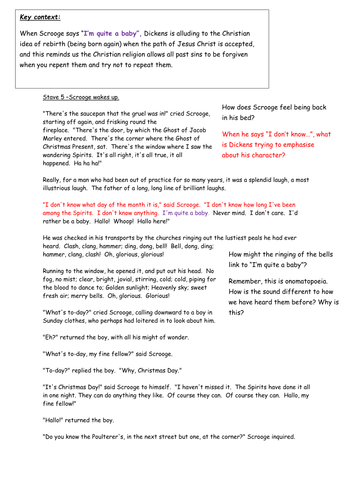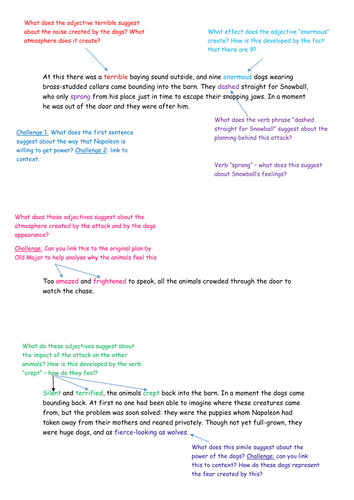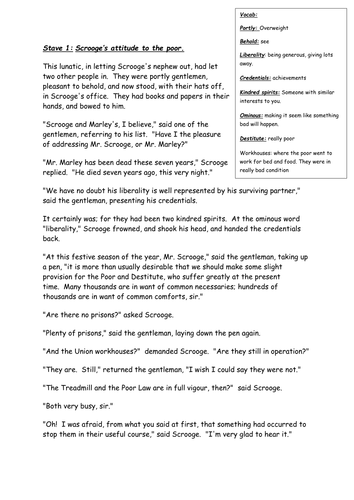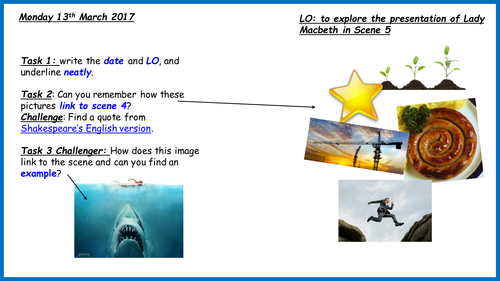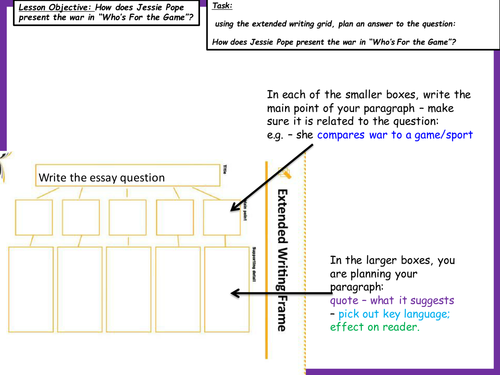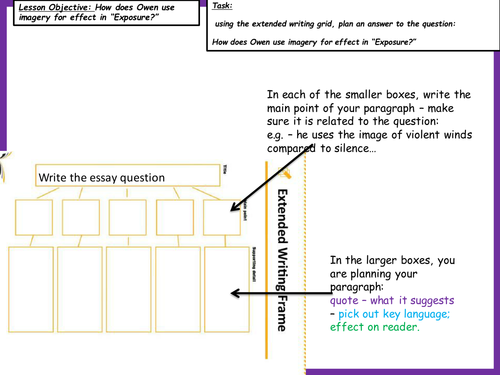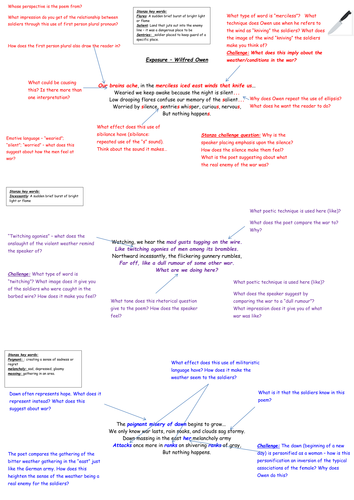
112Uploads
52k+Views
27k+Downloads
All resources

A Midsummer Night's Dream Year 8 Scheme of Work Lesson 5 Mechanicals Act 1, Scene 2
The fifth lesson in a scheme of work which explores the function of the Mechanicals in Act 1, Scene 2. This is aimed at year 8, but can be adapted.
Includes exploration of the story of Pyramus and Thisbe.
Exploration of the specific characterisation of Bottom.
Analysis of the scene - with scaffolded questions.
Writing frame on slide for written task.

Year 7 The Boy in the Striped Pyjamas Exploring the opening
I watched the film first with my class so that they could get to grips with the plot. With other groups, I have found this useful in being able to get a deeper analysis as they are not struggling to comprehend the plot. Also, it is useful for teaching foreshadowing etc.

Year 7 gothic A Christmas Carol easy read inference
A lesson beginning to look at indepedent inference with low ability year 7 - using A Christmas Carol as a stimulus.

Checking Out Me History and London comparison scaffold Power and Conflict AQA 2017
Here are 2 support sheets for writing a comparison essay between London and Checking Out Me History. Used with bottom set year 10.
The Hap sheet is designed to walk students through how to write a sophisticated essay - using advice given in my AQA examiner training.
The LAP sheet is similar, but has a writing frame for more support.
It covers the theme of anger - so a comparison of how both poets explore restriction; response to anger in both; one paragraph on structure.
Checking Out Me History and London comparison scaffold Power and Conflict AQA 2017

Matching persuasive device to audience and situation - speeches and debates unit
A task to get students to think about register they would use for different audiences and purposes.
In pairs or individually, give each student a card with a technique, picture and scenario, and get them to write an example.
Then, get students to mark each other's and give improvement.
If time, get students to have another go with other cards and work on their green pen target.

KS3 Of Mice and Men Analysis of Chapter 3. AQA 2017 skill prep
A lesson analysing aspects of chapter 3, and how foreshadowing is used.
Starts of with chapter 3 recall, before looking at model of lang analysis to build as a class.
Students then work in pairs, and then individually, to analyse scaffolded quotes.
Final part of lesson is looking at a model answer and checklist, before writing their own paragraph using lesson resources and checklist.
Potentially need 1 and a half lessons for this.

AQA 9-1 2017 English Language Letter writing
Using Jamie Oliver and social media is a topic, lesson teaching very low ability how to write a letter. There had been prior learning of letter writing techniques.

Year 8 (prep for new AQA 2017 GCSE) OMAM character analysis group work lesson Ch 2
Students exploring how characters are presented in Ch2, making links to context.
Put into 6 groups - nominate a group leader who can help to guide group - probably a HAP.
Rotate every 10 minutes.

Animal Farm AQA 9-1 Lesson 3 Analysing chapter 1 Low Ability
Leading on from lesson 2, where students explored Old Major and Karl Marx, this lesson begins analysis skills.
In this lesson, I also taught the y into -ies rule where I spoke to one student specifically about it and explained a few times throughout the lesson, and then I asked that student to teach the whole class. Worked very well.

Low ability Y11 AQA 2017 A Christmas Carol Stave 4 Key extracts revision booklet
A booklet to enable teacher to lead students through stave 4 of ACC, with references to key context and focus questions.
Very chalk and talk, but necessary at this point.

Low ability Y11 AQA 2017 A Christmas Carol Stave 5 Key extracts revision booklet
A booklet to enable teacher to lead students through stave 5 of ACC, with references to key context and focus questions.
Very chalk and talk, but necessary at this point.

Year 9 AQA 2017 9-1 A Christmas Carol Lesson 4- Marley's ghost
A lesson exploring the relevance of the idea of the ghost to the novella, and then analysing the presentation of Marley's ghost.

Year 9 Low Ability Macbeth AQA 9-1 Exploring the Captain's Speech Scene 2
A lesson exploring the presentation of Macbeth.
I try to drip feed them the context so that they know where to link. I also introduce them to new vocab each lesson too - and recap the next.
With this lesson, I annotated my own copy of the text.
I looked at how he is presented as an "eagle" and "lion" - like an apex predator- unbeatable.
Also, "cannons overcharged" - like a lethal weapon, ruthlessly attacking.
I also explored idea of a tragic flaw - character has to appear noble so that the downfall is even more shocking.
Challenge part of the lesson - how does Shakespeare perhaps subtly suggest that Macbeth has ability to be evil? "bathe in reeking wounds" and "Golgotha" quotes - suggest that he actually enjoys death, and takes pleasure in it. Killing the traitor was not just a task, but something he enjoyed - sadistic?
Those were the notes I used for the lesson.

Animal Farm AQA 9-1 2017 Low Ability Year 9 analysing chapter 5 - snowball's end
A lesson analysing key language - scaffolded quotes for low ability year 9.
First lesson removing writing frame for them to develop more independent writing skills. There are challenges to develop analysis for higher abilities.
Checklist for peer assessment.

Year 9 AQA 2017 9-1 A Christmas Carol Lesson 2 - Scrooge's attitude to the poor.
A lesson exploring the context of the poor in Victorian England, and how Scrooge represents this.
starts with differentiated cloze taken from tes and adapted.

AQA 9-1 Lady Macbeth presentation Act 1 Scene 5 Low ability Year 9 (2 lessons here)
Lesson plan notes.
Start off lesson recapping previous one where we had looked at scene 4 and learnt what dramatic irony was. Use of images to recap and check understanding. (answer notes beneath slide)
Information sheet on women in Jacobean England - read and consider references to where LM is different (knowledge from having watched film).
Read scene with context activity.
Students put in differentiated groups - with one HAP in each group to support - to look at quotes. Group one have easiest quotes - HAP to help develop.
Groups 3 and 4 - same quotes but opposite way round - this means if they only get one done, the other group have analysed the other in detail.
LSA works with group 2, teacher to work with group 1 and circulate with 3 and 4 from time to time to check progress and understanding.
Students to present their quotes - other groups to make notes around their text.

Year 8 World War One unit - extended writing about Exposure
The class had spent 2 lessons exploring Exposure. This lesson they worked on writing critical and analytical paragraphs.

